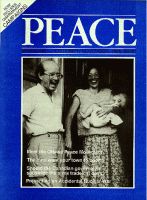
Peace Magazine Oct-Nov 1986, page 34. Some rights reserved.
Search for other articles by Carol King here
The province of British Columbia prides itself on being the peace centre of Canada; Vancouver even refers to itself as the "peace centre of the world." And there is much truth in such claims. For many B.C. communities, the third week in April is Peace Week, when public forums, seminars, film festivals, and cultural events are devoted to the examination of peace. In Vancouver, the once-a-year peace walk, which is co-sponsored by the Vancouver City Council and the Vancouver School Board, attracts an average of 75,000 people-about one out of every fifteen persons in the lower mainland. The Vancouver School Board, as well as a number of other school boards, supports the necessity for and inclusion of peace education within their schools. And the B.C. Teachers' Federation has an active and thriving peace education program.
From these facts one might conclude that schools in B.C. are rising to the challenge of educating for a nuclear age. Not necessarily so. There is tremendous support for the idea of peace education, but much less support for implementing it. Here are a few examples of the problem.
Everyone agrees that peace is a "motherhood and apple pie" issue-something to be fervently hoped for. Why, then, is there reluctance to teach it? To answer this, we must reflect on what peace education is and is not and also on the structure of a school system.
To many, "peace education" means partisan education, appeasement education, pacifist education. It means education through indoctrination and propaganda. Too often, it is equated with pro-Soviet sympathy. But peace education is not partisan education. To be nonpartisan, one must be willing to question many points of view, while partisan education encourages a right/wrong way of thinking.
The choice of curriculum materials is largely a subjective matter. Yet rarely does a teacher encourage the class to examine the content of the chosen textbook and ask:
Where did this information come from? Is the source reliable? What are the assumptions and biases in this information? Why was this material included and not this other material? Why are we doing this? The students themselves find it upsetting to question the "right" answers, which they must learn if they are to pass an examination.
Peace education, with its emphasis on questions of this type, is actually less partisan and more objective than traditional teaching methods. In the current educational system, it has little chance. For it to succeed, traditional expectations and evaluative standards must become less important. For many students, grades are the primary concern. Moreover, much of every teacher's time is spent in evaluation. How can one evaluate the correctness of an answer if the purpose of the question is to elicit a multiplicity of responses and solutions? Students, when confronted with an issue that has no pat answer, commonly respond with bewilderment, frustration, and anger. They have not been taught to deal with topics that have no single right or wrong answer.
The world does contain facts. A noun is a noun and not a verb. An algebra problem will have one solution, not two or twenty. But it is a mistake to expect that of all important subjects. In the humanities, what should count more is the multiplicity of perspectives and the examination of why certain , but not other, information is presented. Likewise, in the sciences it is vital to study the social, moral, and ethical implications of scientific and technological developments.
Peace education, with its emphasis on multiple perspectives, empathy, compassion, respect, and a search for alternative solutions to problems, asks educators to question what and how they have been teaching. It invites an examination of the structures of power and authority in schools. Finally, it assumes that teachers will themselves model the qualities that they teach.
This is hard work, and it may mean relinquishing some of the power to dispense knowledge. It means empowering students to ask their own questions and seek their own answers. Only then does real education begin-for in our world, there are few easy answers and little certainty. This must become the Truth in education.

Peace Magazine Oct-Nov 1986, page 34. Some rights reserved.
Search for other articles by Carol King here